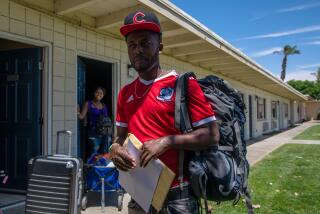Room for Families at the Children’s Inn : Medicine: In the past, children with life-threatening illnesses had to be separated from care-givers. But at the National Institutes of Health motel, parents can cook and care for them much as they do at home.
BETHESDA, Md. — Until recently, whenever 10-year-old Christina Han of Parkton, Md., and her mother visited the National Institutes of Health to obtain treatment for a rare form of cancer that Christina has contracted, they have had to make do staying in a local motel.
But motels aren’t equipped to provide for youngsters such as Christina, who has Ewing’s sarcoma, a rare form of cancer. Many who are on chemotherapy spend much of the day unable to eat, and may wake up hungry at 2 a.m.--well after the restaurant has closed.
“You can’t call room service, and you can’t leave your child alone to go out and find an all-night supermarket,” an NIH staffer points out.
Now comes the Children’s Inn--a special NIH motel facility where the family can walk down the hall to one of two spacious 24-hour kitchens and make its own sandwiches--with food the parents brought themselves and stored earlier in a refrigerator.
If it’s been a tough day, and you need someone to talk to, there’s almost certainly another parent nearby who has been going through a similar ordeal and who can provide some emotional support. And there are two playrooms full of toys.
“It makes me think of home,” Christina said during her last visit here.
The opening of the Children’s Inn in June was the culmination of a longtime dream of NIH staffers. Located on the NIH campus, the facility is a kind of halfway house for children who are being treated at the NIH clinical center and their families.
Here, parents can cook and care for their children much as they do at home. The two sunlit playrooms make it easy for parents to keep an eye on their kids. One even has special glass that filters out ultraviolet rays (chemotherapy often makes skin sensitive to sunlight).
There even is space for brothers and sisters, or even grandparents to stay.
Most important, there is the comforting presence of other parents, many of whom are experiencing the same kinds of problems in coping with their child’s illness.
“It will open up a whole new way of doing medicine,” says Dr. Philip Pizzo, chief of pediatrics at the National Cancer Institute, who was the driving force behind the project.
Dr. Lori Wiener, coordinator of the cancer institute’s pediatric HIV psychosocial support program, agrees. “It’s made a world of difference for the children and their families,” she says.
The idea behind the inn is to help families adjust to a chronic or acute illness, and to enable children who are facing a life-threatening illness to be with their families in an environment that is designed to support them.
“In the past, they had to be separated--siblings left with an alterative care-giver, with visions of their sick brothers or sisters far from home in a frightening environment,” Wiener says. “Now they’re able to see what their brothers and sisters really go through.”
The inn was built with a $3.7-million gift by Merck & Co., but it depends on continuing donations to keep functioning. The building, which has a stone-and-shingle exterior, is set on two acres of rolling hills, with 32,000 square feet of living space spread over two floors.
It is a cheerful building, with pastel colors, and flooded with sunshine. There is a community room with a 2 1/2-story central fireplace and atrium. Skylights and a large expanse of glass--with a view of the surrounding woods--create a bright, airy atmosphere.
The rooms--fitted with country-style furniture and incandescent lighting--are private, but are linked by common areas. As a result, families can have privacy when they want it--as well as places to gather with other parents and children.
There is also a game room, a library, two communal kitchens, a TV room, a solarium, a computer room, and two dining rooms.
The inn can accommodate more than 100 people at a time. Guests are asked to donate $10 a night to help cover expenses. But the facility is free for those who cannot afford the fee.
For Shirley Gibson, of Columbiaville, Mich., whose 18-year-old son is a hemophiliac who has AIDS, the inn provides “a sense of control over your life when there are so many things you don’t have control over. For us, it’s made a big difference,” she says.
Lisa Devila of Seattle agrees. “My son loves the inn,” she says. “They have computers, Nintendo games, food you can get whenever you want it, and for me, I can share what I’m going through with other parents”--the very reasons that the inn was built.






